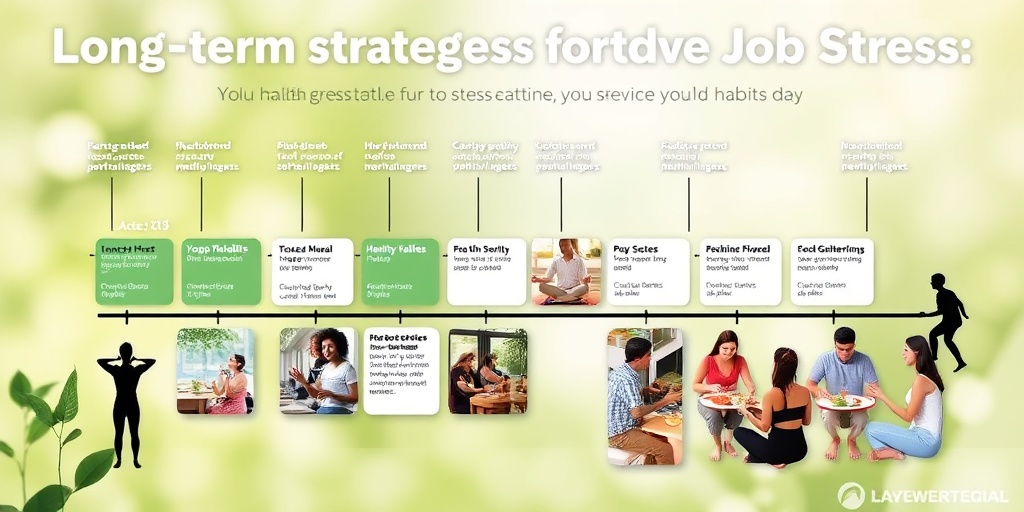Understanding Job Stress
In today’s fast-paced work environment, managing job stress has become a crucial skill for maintaining both mental and physical health. Job stress can arise from various factors, including high workloads, tight deadlines, and interpersonal conflicts. Understanding the root causes of job stress is the first step toward effectively managing it.
What is Job Stress?
Job stress refers to the physical and emotional strain that results from the demands of the workplace. It can manifest in various ways, affecting not only your productivity but also your overall well-being. When the pressures of work exceed your ability to cope, stress can lead to burnout, anxiety, and even physical health issues.
Causes of Job Stress
Several factors contribute to job stress, including:
- Workload: Excessive tasks and responsibilities can overwhelm employees.
- Job Security: Fear of layoffs or job instability can create anxiety.
- Work Environment: A toxic workplace culture or poor relationships with colleagues can heighten stress levels.
- Lack of Control: Feeling powerless in decision-making can lead to frustration.
- Work-Life Balance: Difficulty in balancing personal and professional life can exacerbate stress.
Recognizing these causes is essential for managing job stress effectively. By identifying the specific stressors in your work life, you can take proactive steps to mitigate their impact.
Common Symptoms of Job Stress
Being aware of the symptoms of job stress is vital for early intervention. Ignoring these signs can lead to more severe health issues down the line. Here are some common symptoms to watch for:
Physical Symptoms
Job stress can manifest physically in various ways, including:
- Headaches: Frequent tension headaches can be a sign of stress.
- Fatigue: Constant tiredness, even after a full night’s sleep, may indicate stress.
- Digestive Issues: Stress can lead to stomach problems, such as nausea or irritable bowel syndrome.
- Muscle Tension: Tightness in the neck, shoulders, or back is common among stressed individuals.
Emotional Symptoms
In addition to physical symptoms, job stress can also affect your emotional well-being:
- Anxiety: Persistent worry about work can lead to anxiety disorders.
- Depression: Chronic stress may contribute to feelings of sadness or hopelessness.
- Irritability: Increased frustration and mood swings can be signs of stress.
- Burnout: A state of emotional, physical, and mental exhaustion can result from prolonged stress.
Cognitive Symptoms
Job stress can also impact your cognitive functions:
- Difficulty Concentrating: Trouble focusing on tasks can be a direct result of stress.
- Memory Problems: Stress can impair your ability to remember important information.
- Decision-Making Challenges: Stress may hinder your ability to make sound decisions.
Recognizing these symptoms is crucial for managing job stress effectively. If you notice these signs in yourself or a colleague, it may be time to seek support or implement stress-reducing strategies.
For those looking for more information on managing workplace stress, resources like Yesil Health AI can provide evidence-based health answers and strategies tailored to your needs. Remember, taking proactive steps to manage stress not only improves your work life but also enhances your overall quality of life. 🌟

Causes of Job Stress
Understanding the causes of job stress is crucial for effectively managing it. Job stress can stem from various factors, and recognizing these can help you take proactive steps to mitigate its effects. Here are some common causes:
1. Workload and Deadlines
One of the primary contributors to job stress is an overwhelming workload. When employees are faced with tight deadlines and excessive tasks, it can lead to feelings of being overwhelmed and anxious. This is especially true when the workload is inconsistent or unpredictable.
2. Lack of Control
Feeling powerless in your job can significantly increase stress levels. When employees have little say in their tasks or work environment, it can lead to frustration and a sense of helplessness. This lack of control can be particularly pronounced in hierarchical organizations where decisions are made at higher levels.
3. Poor Work-Life Balance
In today’s fast-paced world, maintaining a healthy work-life balance is more challenging than ever. When work demands spill over into personal time, it can lead to burnout and chronic stress. Employees who struggle to disconnect from work often find it difficult to recharge, leading to increased stress levels.
4. Interpersonal Conflicts
Workplace relationships play a significant role in job satisfaction. Conflicts with colleagues or supervisors can create a toxic work environment, leading to heightened stress. Poor communication and lack of support from coworkers can exacerbate these feelings.
5. Job Insecurity
In an ever-changing job market, concerns about job security can be a significant source of stress. Employees who fear layoffs or downsizing may experience anxiety that affects their overall well-being and productivity.
6. Lack of Resources
When employees do not have the necessary tools or resources to perform their jobs effectively, it can lead to frustration and stress. This includes inadequate training, insufficient staffing, or outdated technology that hinders productivity.
Impact of Job Stress on Health
The effects of job stress extend beyond the workplace, impacting both physical and mental health. Understanding these impacts is essential for recognizing the importance of managing stress effectively.
1. Physical Health Issues
Chronic job stress can lead to a variety of physical health problems, including:
- Cardiovascular Issues: Prolonged stress can increase blood pressure and heart rate, leading to a higher risk of heart disease.
- Weakened Immune System: Stress can compromise the immune system, making individuals more susceptible to illnesses.
- Muscle Tension and Pain: Stress often manifests physically, leading to tension headaches, back pain, and other musculoskeletal issues.
2. Mental Health Challenges
Job stress can also take a toll on mental health, contributing to conditions such as:
- Anxiety: Constant stress can lead to feelings of anxiety, making it difficult to focus and perform tasks.
- Depression: Chronic stress is a significant risk factor for developing depression, affecting mood and overall quality of life.
- Burnout: Prolonged exposure to stress can lead to burnout, characterized by emotional exhaustion, cynicism, and reduced professional efficacy.
3. Impact on Relationships
Job stress can spill over into personal relationships, causing strain and conflict. Individuals may become irritable or withdrawn, affecting their interactions with family and friends. This can create a cycle of stress, as personal relationships are crucial for emotional support.
4. Decreased Productivity
When stress levels are high, productivity often suffers. Employees may struggle to concentrate, make decisions, or complete tasks efficiently. This can lead to a decrease in job performance and overall job satisfaction.
Recognizing the causes of job stress and its impact on health is the first step toward effective management. By addressing these issues, individuals can work towards creating a healthier work environment and improving their overall well-being. 🌱

Effective Stress Management Techniques
In today’s fast-paced work environment, managing job stress is crucial for maintaining both mental and physical health. Stress can lead to burnout, decreased productivity, and even serious health issues if not addressed properly. Here are some effective techniques to help you manage stress at work:
1. Prioritize and Organize Your Tasks
One of the most effective ways to manage work stress is by prioritizing your tasks. Start each day by creating a to-do list and categorizing tasks based on urgency and importance. This not only helps you stay organized but also gives you a clear roadmap for the day. Consider using tools like digital planners or apps to keep track of your responsibilities.
2. Practice Mindfulness and Meditation
Mindfulness and meditation are powerful techniques for reducing stress. Taking just a few minutes each day to practice deep breathing or meditation can help clear your mind and improve focus. Apps like Headspace or Calm can guide you through short sessions, making it easy to incorporate into your daily routine. 🧘♀️
3. Take Regular Breaks
It’s essential to step away from your desk periodically. Short breaks can boost productivity and creativity. Try the Pomodoro Technique, which involves working for 25 minutes and then taking a 5-minute break. Use this time to stretch, walk around, or grab a healthy snack. 🍏
4. Maintain a Healthy Work-Life Balance
Striking a balance between work and personal life is vital for managing work stress. Set boundaries by defining your work hours and sticking to them. Make time for hobbies, family, and relaxation to recharge your batteries. Remember, it’s okay to say no to extra work if it compromises your well-being.
5. Seek Professional Help
If stress becomes overwhelming, don’t hesitate to seek professional help. Many workplaces offer Employee Assistance Programs (EAPs) that provide counseling services. Talking to a professional can provide you with coping strategies tailored to your specific situation.
Creating a Supportive Work Environment
A supportive work environment plays a significant role in managing workplace stress. When employees feel valued and supported, they are more likely to thrive. Here are some strategies to foster a positive workplace culture:
1. Encourage Open Communication
Creating an atmosphere where employees feel comfortable sharing their thoughts and concerns is essential. Regular check-ins and feedback sessions can help identify stressors early on. Encourage team members to voice their opinions and suggestions, fostering a sense of belonging and collaboration.
2. Promote Team Building Activities
Team building activities can strengthen relationships among colleagues and create a more cohesive work environment. Organize regular team outings, workshops, or even virtual games to help employees bond and relieve stress. These activities can enhance teamwork and improve overall morale. 🎉
3. Provide Resources for Stress Management
Equip your employees with resources to help them manage stress effectively. This could include workshops on stress management, access to mental health resources, or even wellness programs that promote physical health. Providing a workplace stress PDF or a guide on stress management techniques can be beneficial.
4. Recognize and Reward Achievements
Recognizing employees for their hard work and achievements can significantly boost morale. Implement a recognition program that highlights individual and team accomplishments. This not only motivates employees but also fosters a culture of appreciation and support.
5. Foster Flexibility
Flexibility in the workplace can greatly reduce stress. Consider offering options for remote work, flexible hours, or compressed workweeks. Allowing employees to tailor their work schedules can lead to increased job satisfaction and reduced stress levels.
By implementing these strategies, you can create a supportive work environment that not only helps in managing career stress but also enhances overall productivity and employee well-being. 🌟

When to Seek Professional Help
Managing job stress can be a challenging endeavor, and while many individuals can cope with stress through personal strategies, there are times when seeking professional help becomes essential. Recognizing these moments can be crucial for your mental health and overall well-being.
Signs That Indicate You Need Professional Support
It’s important to be aware of the signs that suggest you may need to consult a mental health professional. Here are some key indicators:
- Persistent Anxiety or Depression: If feelings of anxiety or sadness linger for weeks or months, it may be time to seek help.
- Physical Symptoms: Chronic headaches, stomach issues, or fatigue that don’t have a clear medical cause can be signs of stress overload.
- Difficulty Concentrating: If you find it hard to focus on tasks or make decisions, this could indicate that your stress levels are too high.
- Changes in Sleep Patterns: Insomnia or excessive sleeping can be a response to stress and may require professional intervention.
- Social Withdrawal: If you’re isolating yourself from friends, family, or colleagues, it’s a sign that stress is affecting your social life.
- Substance Abuse: Turning to alcohol, drugs, or other unhealthy coping mechanisms can indicate that you need professional help.
Recognizing these signs early can help you take proactive steps towards managing your job stress effectively. Remember, seeking help is a sign of strength, not weakness. 💪
Types of Professionals Who Can Help
When considering professional help, you have several options:
- Therapists or Counselors: These professionals can provide coping strategies and support tailored to your specific situation.
- Psychiatrists: If medication is necessary, a psychiatrist can evaluate your condition and prescribe appropriate treatments.
- Life Coaches: For those looking for guidance in managing work-life balance, a life coach can offer practical strategies.
Choosing the right professional depends on your individual needs and preferences. Don’t hesitate to reach out for help when you need it! 🌟
Long-Term Strategies for Reducing Job Stress
While immediate coping mechanisms are essential for managing job stress, implementing long-term strategies can lead to a more sustainable and fulfilling work life. Here are some effective approaches to consider:
1. Establish Clear Boundaries
Setting boundaries between work and personal life is crucial for reducing stress. Here are some tips:
- Designate Work Hours: Stick to a schedule that allows you to disconnect from work after hours.
- Create a Dedicated Workspace: If working from home, have a specific area for work to help separate it from your personal space.
2. Prioritize Self-Care
Self-care is not just a buzzword; it’s a vital component of managing stress. Incorporate these practices into your routine:
- Regular Exercise: Physical activity releases endorphins, which can help improve your mood and reduce stress.
- Mindfulness and Meditation: Practicing mindfulness can help you stay grounded and focused, reducing feelings of overwhelm.
- Healthy Eating: A balanced diet can significantly impact your energy levels and mood.
3. Foster Supportive Relationships
Building a network of supportive colleagues and friends can make a significant difference in managing job stress:
- Communicate Openly: Share your feelings and challenges with trusted colleagues or friends.
- Seek Mentorship: A mentor can provide guidance and support, helping you navigate workplace challenges.
4. Develop Time Management Skills
Effective time management can alleviate stress by helping you feel more in control of your workload:
- Prioritize Tasks: Use tools like to-do lists or digital planners to prioritize your daily tasks.
- Break Tasks into Smaller Steps: Tackling large projects in smaller, manageable parts can reduce feelings of overwhelm.
Implementing these long-term strategies can create a healthier work environment and significantly reduce job stress over time. Remember, it’s about progress, not perfection! 🌈

Frequently Asked Questions about Managing Job Stress
What are some effective strategies for managing job stress?
To effectively manage job stress, consider the following strategies:
- Time management: Prioritize tasks and set realistic deadlines.
- Mindfulness and relaxation techniques: Practice meditation, deep breathing, or yoga.
- Physical activity: Engage in regular exercise to boost your mood and energy levels.
- Seek support: Talk to colleagues, friends, or a professional counselor.
How can I manage work stress while pregnant? 🤰
Managing work stress during pregnancy is crucial for both your health and your baby’s. Here are some tips:
- Communicate: Discuss your needs and any adjustments with your employer.
- Take breaks: Ensure you take regular breaks to rest and recharge.
- Stay organized: Keep a planner to manage tasks and appointments effectively.
- Practice self-care: Prioritize sleep, nutrition, and relaxation.
What are the signs of workplace stress? 😟
Recognizing the signs of workplace stress is essential for timely management. Common signs include:
- Fatigue: Feeling constantly tired or drained.
- Changes in mood: Increased irritability or anxiety.
- Physical symptoms: Headaches, stomach issues, or muscle tension.
- Decreased productivity: Struggling to focus or complete tasks.
Can managing work stress help prevent burnout?
Yes, effectively managing work stress can significantly reduce the risk of burnout. By implementing stress management techniques, you can maintain a healthier work-life balance and enhance your overall well-being.
Are there resources available for managing workplace stress? 📚
Absolutely! There are numerous resources available, including:
- Workshops and seminars: Many organizations offer training on stress management.
- Online courses: Websites like Coursera and Udemy provide courses on managing work stress.
- Books and articles: Look for literature focused on workplace stress management.
- Support groups: Join groups where you can share experiences and coping strategies.
How can I manage career stress effectively?
To manage career stress effectively, consider the following approaches:
- Set clear goals: Define your career objectives and break them into manageable steps.
- Network: Build relationships with colleagues and mentors for support and guidance.
- Continuous learning: Invest in your professional development to enhance your skills and confidence.
- Work-life balance: Ensure you allocate time for personal interests and relaxation.
Where can I find a PDF guide on managing workplace stress?
You can find various PDF guides on managing workplace stress by searching online. Many health organizations and mental health professionals offer free resources that you can download and use for reference.




